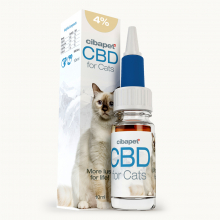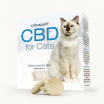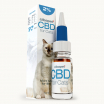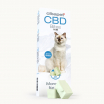Can CBD Oil Help Cats with Itching?
Published:
Itching and scratching can be normal grooming behaviors for cats. But excessive licking, chewing, and scratching may indicate a medical issue. CBD oil is growing in popularity as a natural treatment for many feline health conditions. But can CBD oil help relieve itching in cats? Let's take a closer look.
Contents:
- What Causes Itching and Skin Irritation in Cats?
- Can CBD Oil Help Relieve Itching in Cats?
- How to Give CBD Oil to Cats for Itching
- What to Look for in CBD Oils for Cat Itching
- Potential Side Effects of CBD for Cats
- Should You Try CBD Oil for Your Cat’s Itching?
- Frequently Asked Questions About Using CBD Oil for Cat Itching
- What types of itching and skin conditions can CBD help with?
- What causes should be ruled out before trying CBD?
- What effects make CBD helpful for cat itching?
- What should I look for in a quality CBD product?
- How can I administer CBD oil to my cat?
- What side effects should I watch for?
- Is CBD safe to use long term for itching?
- Are there risks if my cat licks CBD balm off their skin?
- Can I use CBD if my cat takes other medications?
- How soon will I know if CBD is helping my cat?
- Summary
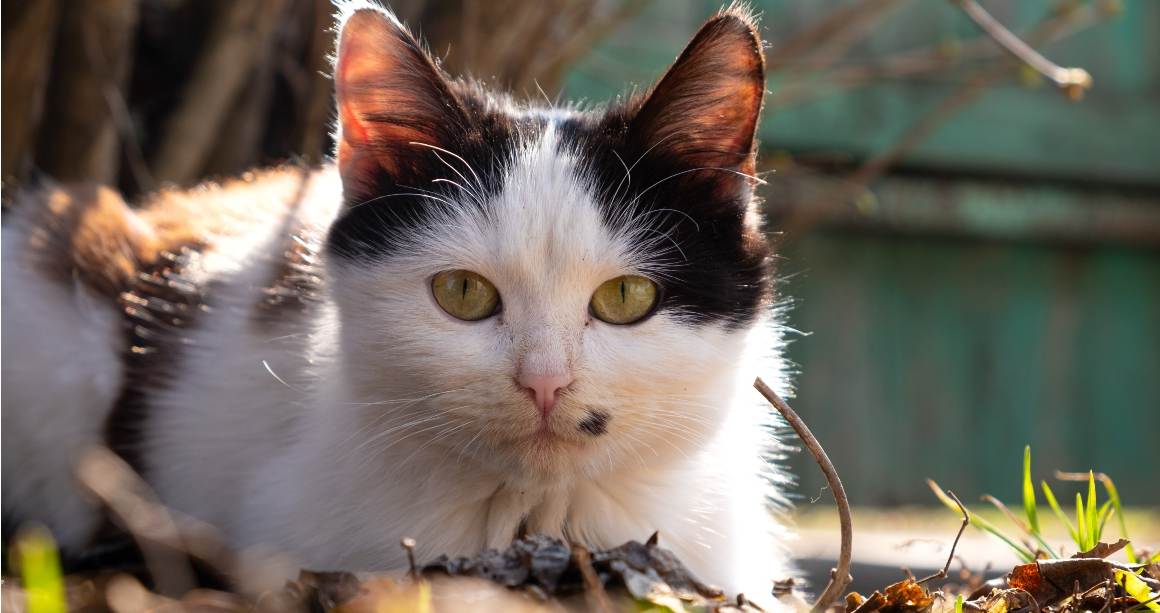
What Causes Itching and Skin Irritation in Cats?
Itching, also known as pruritus, is common in cats. Causes range from natural shedding to serious medical conditions. Common culprits behind feline itching and scratching include:
- Allergies - Just like humans, cats can develop environmental or food allergies leading to itchy skin. Common allergy triggers include pollen, mold, dust mites, flea bites, and ingredients in food.
- Parasites - Fleas, mites, lice, and ticks can bite and burrow into a cat's skin causing inflammation and itchiness. Flea allergy dermatitis is particularly bothersome.
- Infections - Bacterial, viral, and fungal skin infections can develop into itchy rashes, scabs, and lesions. Ringworm is a contagious fungal infection.
- Dry Skin - Feline xerosis or dry, flaky skin may irritate cats and lead to scratching. Causes include low humidity, excessive grooming, nutritional deficiencies, and skin conditions.
- Stress and Anxiety - Similar to nervous scratching and nail biting in humans, stress and anxiety can trigger obsessive licking, chewing, or scratching in cats.
- Other Skin Disorders - Dandruff, eczema, hives, and yeast infections often involve itching. Cats may excessively groom irritated areas.
So if your cat is excessively scratching, biting, or overgrooming areas of skin, it's important to identify the underlying cause. Treating the source of itching is key to providing relief.
Can CBD Oil Help Relieve Itching in Cats?
CBD, short for cannabidiol, is a natural compound extracted from hemp and cannabis plants. CBD offers therapeutic effects without causing a marijuana “high”.
While CBD is not a cure, research suggests it may help relieve itching and skin irritation in cats by:
- Reducing inflammation - CBD exhibits anti-inflammatory properties that may ease itching and discomfort caused by rashes, hives, infections, and skin allergies.
- Limiting histamine release - CBD may help stabilize mast cells that trigger histamine release during inflammatory and allergic reactions leading to itchy skin.
- Soothing dry, irritated skin - With moisturizing properties, CBD topicals may hydrate dry skin and provide relief for cats prone to xerosis and flakiness.
- Calming anxious behaviors - For stress-triggered scratching, CBD’s calming effects may reduce anxiety and obsessive licking or chewing.
So while not directly treating the root causes of feline itching, CBD oil may help control associated inflammation, irritation, dry skin, and anxiety. Always pair CBD with treatments targeting the underlying condition for the best results.
How to Give CBD Oil to Cats for Itching
CBD oil can be administered to cats in a few different forms:
CBD Oils and Tinctures
CBD oils and tinctures designed for pet consumption can easily be added to your cat's wet food or applied directly into the mouth. This allows for precise dosage control. Effects kick in within 30 minutes to an hour. Oils work well for overall skin health and reducing anxious scratching.
CBD Topicals and Balms
For targeted relief, CBD balms, creams, and salves can be gently rubbed on irritated patches of skin, paw pads, or other problem areas. Topicals provide more localized effects by penetrating the skin. However, cats may lick topicals off before they fully absorb.
CBD Treats and Chews
Tasty CBD-infused treats and chews make dosing easy. However, effects take longer to onset at around 2 hours. Treats work best for maintenance and preventing itch flare-ups. Monitor treat intake to avoid overeating.
No matter the form, introduce CBD slowly into your cat's routine and monitor for side effects like diarrhea and changes in appetite. Discuss appropriate dosing with your veterinarian. Most cats tolerate CBD well.
What to Look for in CBD Oils for Cat Itching
With an abundance of CBD brands now available, quality matters when choosing an oil for your cat. Here are the key criteria to look for:
- Organic hemp sourcing - High-grade CBD oils use organic hemp free of pesticides and other toxins. Colorado, Kentucky, and Oregon have reputable hemp farms.
- Full-spectrum extract - Look for full-spectrum CBD oils that provide a rich blend of cannabinoids and terpenes from the hemp plant versus isolates.
- Third-party lab testing - Reputable brands test for purity and CBD/THC levels. Avoid products without up-to-date Certificates of Analysis (COAs).
- Dosing options - Oils, tinctures, treats, and capsules give you options for proper dosing based on your cat’s weight.
- Potency - For cats, oils with a potency between 250mg to 500mg CBD per bottle often work well. Start low and increase slowly as needed.
When comparing CBD brands, be an informed consumer and look beyond marketing claims. Focus on the above criteria to find high quality CBD oil for cats.
Potential Side Effects of CBD for Cats
While generally well-tolerated, CBD can cause a few side effects in cats to be aware of. Potential adverse reactions include:
- Diarrhea or vomiting
- Temporary sedation and fatigue
- Increased thirst and urination
- Changes in appetite and weight
- Interactions with other medications
These effects are mild and often resolve on their own. But if symptoms persist or worry you, stop CBD administration and follow up with your veterinarian. They can advise you on proper dosing and potential drug interactions.
It’s also important to note that hemp-derived CBD oils contain less than 0.3% THC. But THC toxicity is still possible at high doses dangerous for cats. Always purchase CBD products from trusted brands that follow ethical manufacturing processes.
Should You Try CBD Oil for Your Cat’s Itching?
While more feline-specific research is still needed, current evidence suggests CBD oil may help soothe itchy skin and control related symptoms when used responsibly.
If your cat is suffering from excessive scratching and no medical treatments have provided relief, CBD may be worth exploring under your veterinarian's supervision. Ensure you choose high quality CBD oils and monitor your cat for any adverse reactions.
CBD works best paired with prescription medications, allergy shots, anti-itch shampoos, or other primary treatments your vet recommends. But as a natural supplement, CBD can provide additional itch relief and improve your cat’s quality of life.
In summary, itching and skin issues significantly impact many cats. CBD oil shows promise in helping to control inflammation, irritation, dryness, and obsessive scratching behaviors. While not a cure, CBD may provide your cat extra comfort until the underlying cause of itching can be properly addressed.
Frequently Asked Questions About Using CBD Oil for Cat Itching
What types of itching and skin conditions can CBD help with?
CBD may help relieve mild to moderate itching caused by:
- Allergies - Environmental or food allergies resulting in hives, rashes, dermatitis
- Flea, mite, tick bites - Inflammation and irritation from parasite bites
- Dry, flaky skin - Feline xerosis worsened by low humidity, nutritional deficiencies
- Hot spots and secondary infections - Patches of infected skin from excessive licking/scratching
- Stress/anxiety - Overgrooming behaviors like obsessive licking or chewing
- Mild skin disorders - Dandruff, eczema flare-ups, yeast infections
For severe itching or skin conditions, seek a veterinarian’s care for proper treatment.
What causes should be ruled out before trying CBD?
Eliminate the following causes first, as CBD will only help control symptoms:
- Parasites - Rule out fleas, mites, etc. with exams and medication
- Skin infections - Diagnose and treat bacterial, viral, fungal infections
- Underlying illnesses - Identify conditions causing itching like kidney disease, liver disease, endocrine disorders
- Cancer - Some cancers like lymphoma can cause severe itching
See your vet to properly diagnose and treat the root cause of unusual or severe itching.
What effects make CBD helpful for cat itching?
CBD’s anti-inflammatory, calming, analgesic, and antioxidant properties work together to:
- Soothe itchy skin and rashes
- Control inflammation and histamine reactions
- Hydrate and heal dry, flaky, irritated skin
- Slow down excessive licking behaviors
- Ease anxiety and stress-related scratching
- Protect skin from damage and infection
Through these mechanisms, CBD provides temporary itch relief while the root causes are addressed.
What should I look for in a quality CBD product?
Only purchase CBD formulated specifically for cats, and look for:
- Organic hemp
- Full-spectrum extracts, not CBD isolates
- 3rd party lab testing and up-to-date COAs
- Potencies between 250mg - 500mg CBD per bottle
- Pet-safe carrier oils like salmon, cod liver, hempseed
- Natural flavoring appealing for cats
Avoid any CBD products containing THC, additives, artificial ingredients, or made for humans.
How can I administer CBD oil to my cat?
The most common methods include:
- Oils/tinctures: Add drops to food, treats, or directly into the mouth
- Topicals: Gently apply balms, creams, or salves to affected skin
- Treats: CBD-infused treats and chews for ease of dosing
Try different methods to see which your cat tolerates best. Always start with small doses and increase slowly if needed.
What side effects should I watch for?
Mild side effects can include:
- Digestive upset - vomiting, diarrhea, lack of appetite
- Increased thirst and urination
- Fatigue or sedation
- Agitation or restlessness
Stop CBD and call your vet if these effects are severe or persist over 24 hours. Seek emergency care if your cat collapses or can’t stand after taking CBD.
Is CBD safe to use long term for itching?
Long term use is likely safe when CBD oils are high quality and used as directed. But cats may build tolerance over time, needing higher doses for the same effects. It’s best to use CBD intermittently rather than daily for extended periods. Follow your vet’s guidance on long term CBD use.
Are there risks if my cat licks CBD balm off their skin?
If consumed in large amounts, CBD balms may cause stomach upset. Prevent excessive licking of topicals by using an e-collar or choosing treats/oils for cats likely to lick. But small ingestions of topicals when grooming are generally not dangerous. Monitor for any vomiting, diarrhea or lethargy.
Can I use CBD if my cat takes other medications?
CBD may interact with some cat medications. Always check with your vet before starting CBD. Monitor for increased sedation, digestive effects, or changes in efficacy of other drugs. Dose adjustments may be needed. Allow 2-3 hours between giving CBD and other oral medications.
How soon will I know if CBD is helping my cat?
Improvements may be noticeable within 30 minutes for topicals or 1-2 hours for oils and treats. But the cumulative effects build over several weeks of consistent use. Give a CBD regimen 2-4 weeks before deciding if it’s providing benefit for your cat’s itching. Adjust the dosage and frequency as needed under veterinary supervision.
Summary
Itching can significantly impact your cat's wellbeing and quality of life. While the root cause requires diagnosis and treatment, CBD oil may help provide relief from inflammation, dry skin, and obsessive scratching behaviors. Consult your vet to see if CBD is right for your feline companion. With responsible use, CBD can be a helpful addition to managing itchy skin issues in cats.









